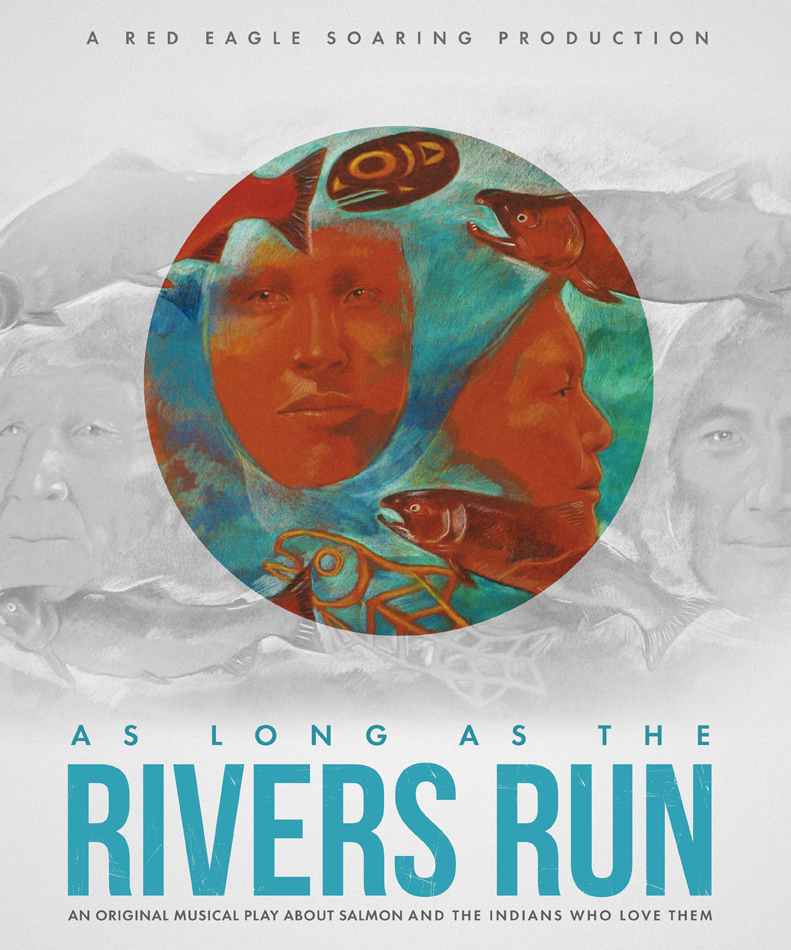Please join Red Eagle Soaring Native Youth Theatre on Sunday, December 15th for a performance of As Long As The Rivers Run, an original musical play by Roger Fernandes (Lower Elwha Klallam) about the historical and contemporary relationship between salmon and Northwest Native peoples. Reception and refreshments following, all are welcome.
Tag: play
Failed Treaty of Point Elliott Promises Spotlighted in Play
Richard Walker, Indian Country Today Media Network
This was James “Smitty” Hillaire’s debut as a stage actor, and yet he emoted anger, frustration and pain like a pro.
“We don’t like to call it acting,” Hillaire said. “We’re trying to tell a story, a story that hasn’t been told … A lot of people didn’t realize why we’re still fighting for our rights today. It’s still going on.”
Hillaire portrays Chowitshoot, a leader of the Lummi people and a reluctant signer of the 1855 Treaty of Point Elliott in “What About Those Promises?”, a stage production about treaty promises that have not been fulfilled by the United States.
To develop the script, Shelly Muzzy pored through transcripts of proceedings stored at the University of Washington. The audience is confronted with a true version of history not like those found in many textbooks.

Here, Chowitshoot and other Lummi representatives raise concerns about how the treaty will affect their rights to fish, hunt, harvest, and continue their way of life. Chief Si’ahl, or Seattle, leader of the Duwamish and Suquamish peoples, urges his peers to not sign the treaty.
The treaty was signed under duress, Hillaire said. “Sign or walk knee deep in blood—those were the words. We had no choice. We were forced to sign.”
The play brings to life the ongoing struggles of the Lummi people to see the promises of the treaty fulfilled, and gives voice to the people involved in those struggles.
The scenes take place when the United States was in the “fever of the termination era” and terminating its treaty responsibilities owed to tribes, Jewell James wrote in Whatcom Watch; he is director of the Lummi Nation’s Sovereignty and Treaty Protection Office. The region’s First People were jailed for trying to fish and harvest in their traditional grounds, as promised in Article 5 of the treaty; their rights to fish and harvest were upheld in 1974 in the U.S. District Court case, U.S. v. Washington, also known as the Boldt decision.
“What About Those Promises?” also reveals to the audience the emotional toll the post-treaty years have had—the residential schools, the termination era, and the continuing fight to protect rights, the environment and sacred places.
“We’ve been treated like animals, actually,” Hillaire said. “I believe we are one of the most regulated people in the whole country. We’re treated like prisoners of war; we’ve never gone to war [against the U.S.], we never surrendered either, but they treat us like a conquered people.”

Hillaire and his wife, Lutie, who also has a role in the play, have been participating in workshops to help them deal with the emotional impacts of historical trauma.
“I have a difficult time right off trying to deal with the anger,” he said. “I have kind of mixed emotions—some of it anger, some of it sadness.”
What producer Darrell Hillaire hopes people take away from his play: “That their word is good. Anybody. All people. All cultures. To keep our word to one another. We have such diverse peoples living in this country, in our communities. How do we best learn to live together? Well, you keep your promises first. From there, you learn to live together.”
State Rep. John McCoy, D-Tulalip, one of two Native Americans in the state House of Representatives, authored laws that require the history and culture of Washington’s First Peoples is taught in the state’s public schools, and allow tribes to open their own schools and create their own curriculum.
“This would be a great production to be out there [in schools],” he said. “You bring in your youngsters and your current leadership and your elders, and then do this production. If every tribe would do that, we’d really educate the state of Washington.”
He added, “Youngsters, you have to listen—listen to the stories of the elders, so we know where we’ve been, so you know where to go.”
The next staging of the production will be October 18 at Seattle University’s Pigott Hall at 7:30 p.m. Tickets are available at BrownPaperTickets.com.
Read more at http://indiancountrytodaymedianetwork.com/2013/09/23/failed-treaty-point-elliott-promises-spotlighted-play-151321


